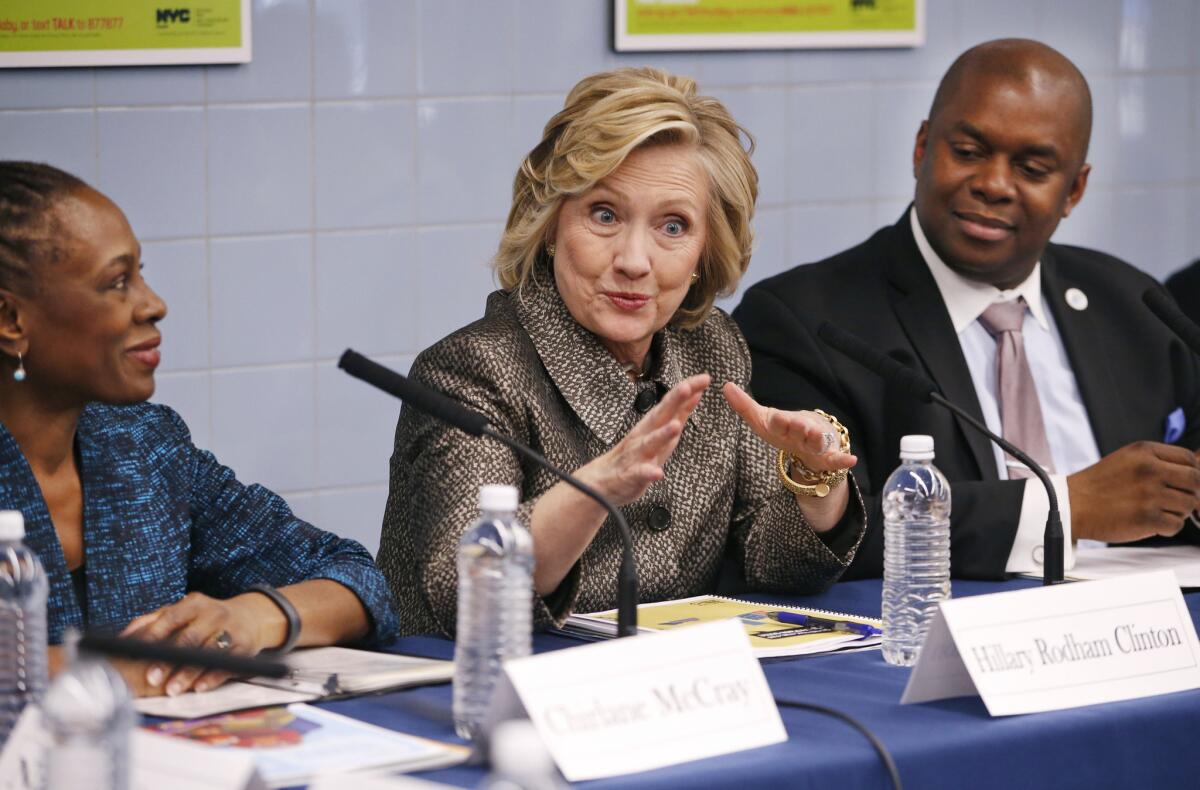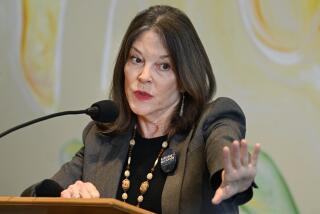Analysis: Launching of Hillary Clinton campaign presents challenges for her team

For Hillary Rodham Clinton, shown in an appearance at an early childhood development center in Brooklyn on April 1, the stagecraft of a presidential campaign launch is fraught with pitfalls about where to begin her run and how to reintroduce herself to voters and change preconceived ideas about her.
The places where presidential campaigns kick off are almost always laden with symbolism, and for most candidates it is welcome.
Sen. Marco Rubio (R-Fla.), a child of Cuban immigrants, will appear at Miami’s Freedom Tower, entry point to the United States for so many Cuban refugees. Fiery social conservative Sen. Ted Cruz (R-Texas) decamped to the Christian evangelical university founded by Jerry Falwell. And libertarian Sen. Rand Paul went home to Kentucky’s Galt House hotel, which shares its name with a protagonist in one of the Ayn Rand novels he treasures.
But for Hillary Rodham Clinton, the stagecraft of the launch is fraught.
Campaign announcements are about introducing yourself to voters. Voters, though, already think they know what Clinton is about. She is among the most famous people in the world, with the intimidating public service resume and cart of political baggage that comes with being a Clinton. Almost anywhere she goes to roll out a campaign, noise from the past will accompany her.
“She needs to do something that indicates to voters they don’t know her as well as they think they do,” said Samuel Popkin, author of “The Candidate: What it Takes to Win — and Hold — the White House.” “How much excitement can there be if they already know everything about you?”
Clinton’s advisors are being tight-lipped about the announcement, which is imminent now that campaign headquarters were leased in Brooklyn last week. Candidates must file papers to run within two weeks of such a transaction. Clinton’s team will say only that the launch will be light on big rallies and speeches and heavy on the candidate interacting with small groups of voters in such cozy venues as homes and diners.
The first such event will attract the most attention. Nobody close to Clinton will say where it will take place.
Even without much — or any — viable opposition for the Democratic nomination, Clinton will leave nothing to chance. A flawed approach in the 2008 primary played big in her eventual defeat that year to then-Sen. Barack Obama. Clinton built her candidacy then almost exclusively around experience, putting off voters who sought a more personal connection, and possibly a more humble candidate. She avoided highlighting her potential to make history as the first female president, despite polls showing it was a big selling point.
While the announcement for the 2016 election is a chance for her to start fresh, it is also an opportunity for the media to resurrect all the mistakes she made in her last run. Every location where she has a meaningful connection also has drawbacks. Early primary states invite comparisons to 2008. Arkansas suggests she is mounting a bid for a third term of the last Clinton White House. Illinois, her native state, might suggest she is seeking a third term of the Obama one.
Clinton’s current home state of New York, where she was elected a U.S. senator as her husband left the White House, carries undertones of elitism. So does Wellesley College, Clinton’s alma mater in Massachusetts.
“She is constrained in ways other candidates are not,” said Kathleen Hall Jamieson, director of the Annenberg Public Policy Center at the University of Pennsylvania. “The test of her success is whether she can get the media to focus on her message rather than how the symbolism of the place she delivers it ties to her past. She has to give the sense that whatever narrative you already have in your head about her, she is more interesting than that.”
Supporters are looking to Clinton to do that by drawing on parts of her background that are unknown to most voters. Her time as secretary of State, as senator, as first lady, even as a Yale Law School student are well known. Voters are less familiar with what happened before then.
“Hillary Clinton is one of the most well-known people probably in the entire world, but that doesn’t mean people know her, or what makes her tick,” said Terry Shumaker, who was the New Hampshire co-chair for both of Bill Clinton’s campaigns for president. He said voters are more likely to have seen her “come out of a limousine” than to be familiar with her modest background.
“I have heard her talk about never dreaming of going to college in the East until a teacher convinced her she should apply,” Shumaker said. “She didn’t know anything about all that .… She is a product of the American Dream. She is aware it is fading for others.”
Shumaker says Clinton knows she needs to draw from those experiences to connect personally with voters in New Hampshire, the state where she resurrected her 2008 campaign with a primary victory — but cannot take for granted now.
“This state has always been perilous terrain for front-runners,” he said. “She recognizes that our harbors are littered with their shipwrecks.”
Lightly scripted, small-group conversations are an obvious choice to offset the perception of imperiousness that weighs on Clinton. Those who know her say it is also the format in which she comes most alive.
“All the things that make someone likable come through for her in that setting,” said Democratic strategist Chris Lehane, who helped guide the Clintons through the Whitewater and Monica Lewinsky scandals in the 1990s while a White House advisor. “There is warmth and spontaneity and humor .… That forum projects openness and transparency. She has to show from Day 1 that she is not taking anything for granted, not being presumptuous.”
But Lehane said that while Clinton would do well to come prepared with stories about her upbringing, and maybe some photos of her granddaughter, the key for her is a big, new idea that voters can rally around. As damaging as it could be for Clinton to have a repeat of her 2008 rollout, it would be even worse to stumble the way Ted Kennedy did in 1979, when the hugely popular Democrat could not clearly articulate to an interviewer why he was running for president. His popularity quickly plummeted, and he lost to Jimmy Carter in the primary.
“The campaign announcement has become a proxy for that interview,” said Lehane. “When you announce, it is a clear opportunity to offer that reason. It is important to get that right at the beginning with a big idea that is authentic to who you are, and communicated and presented in a compelling way.”
More to Read
Get the L.A. Times Politics newsletter
Deeply reported insights into legislation, politics and policy from Sacramento, Washington and beyond. In your inbox three times per week.
You may occasionally receive promotional content from the Los Angeles Times.







